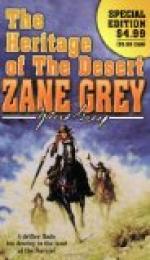“How are things?” queried Dave.
“We can’t complain much,” replied Zeke, “though we’ve wasted some time on old Whitefoot. He’s been chasing our horses. It’s been pretty hot and dry. Most of the cattle are on the slopes; fair browse yet. There’s a bunch of steers gone up on the mountain, and some more round toward the Saddle or the canyon.”
“Been over Seeping Springs way?”
“Yes. No change since your trip. Holderness’s cattle are ranging in the upper valley. George found tracks near the spring. We believe somebody was watching there and made off when we came up.”
“We’ll see Holderness’s men when we get to riding out,” put in George. “And some of Dene’s too. Zeke met Two-Spot Chance and Culver below at the spring one day, sort of surprised them.”
“What day was that?”
“Let’s see, this’s Friday. It was last Monday.”
“What were they doing over here?”
“Said they were tracking a horse that had broken his hobbles. But they seemed uneasy, and soon rode off.”
“Did either of them ride a horse with one shoe shy?”
“Now I think of it, yes. Zeke noticed the track at the spring.”
“Well, Chance and Culver had been out our way,” declared Dave. “I saw their tracks, and they filled up the Blue Star waterhole—and cost us three thousand sheep.”
Then he related the story of the drive of the sheep, the finding of the plugged waterhole, the scent of the Colorado, and the plunge of the sheep into the canyon.
“We’ve saved one, Mescal’s belled lamb,” he concluded.
Neither Zeke nor George had a word in reply. Hare thought their silence unnatural. Neither did the mask-like stillness of their faces change. But Hare saw in their eyes a pointed clear flame, vibrating like a compass-needle, a mere glimmering spark.
“I’d like to know,” continued Dave, calmly poking the fire, “who hired Dene’s men to plug the waterhole. Dene couldn’t do that. He loves a horse, and any man who loves a horse couldn’t fill a waterhole in this desert.”
Hare entered upon his new duties as a range-rider with a zeal that almost made up for his lack of experience; he bade fair to develop into a right-hand man for Dave, under whose watchful eye he worked. His natural qualifications were soon shown; he could ride, though his seat was awkward and clumsy compared to that of the desert rangers, a fault that Dave said would correct itself as time fitted him close to the saddle and to the swing of his horse. His sight had become extraordinarily keen for a new-comer on the ranges, and when experience had taught him the land-marks, the trails, the distances, the difference between smoke and dust and haze, when he could distinguish a band of mustangs from cattle, and range-riders from outlaws or Indians; in a word, when he had learned to know what it was that he saw, to trust his judgment, he would have acquired the basic feature of a rider’s training. But he showed no gift for the lasso, that other essential requirement of his new calling.




